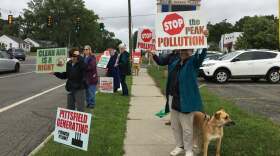The Pittsfield, Massachusetts Board of Health has unanimously backed a petition calling for three Berkshire County power plants to transition to green energy.
Representatives from the Berkshire Environmental Action Team presented the petition at a public meeting Wednesday night.
“So what are ‘peaking’ plants? These are fossil fueled, electric generating plants that run only when the grid is maxed out. So usually on the hottest day of the year, especially if it's been really hot and humid for several days in a row. This peak in power usage is usually from about 3 p.m. to 8 p.m," explained Executive Director Jane Wynn. “They emit a tremendous amount of pollution for that little bit of electricity they generate. That pollution includes fine particulate matter, nitrogen oxides, sulfur oxides, and these facilities are very expensive for our electric ratepayers in the Berkshires. We pay millions of dollars to keep them on standby. When they do run, they're some of the most expensive electricity generation that we have.”
Of the three “peaker” plants in Berkshire County, two are in Pittsfield – one on Doreen Street and another on Merrill Road.
“Pittsfield Generating on Merrill Road are the three big stacks that you see," said Wynn. "It's over 30 years old, and primarily runs on fracked gas, or else fuel oil. Even though in 2018, it was only running less than 5% of the time, it accounted for 15% of Pittsfield stationary emissions. That's over 60,000 metric tons in 2018.”
The plant is on the former site of the General Electric facilities that polluted Pittsfield’s land and water for decades in the 20th century. Wynn noted a public health study from 2019 showed the lowest average life expectancy in Berkshire County was in the Morningside Neighborhood directly adjacent to the GE campus, at 71 years – well below the national average of over 79.
“Pittsfield Generating is right next to Allendale Elementary School, within three miles of Morningside and right next to the two toxic PCB waste dumps,” she said.
BEAT member Henry Rose noted that Pittsfield’s two “peaker” plants are near environmental justice neighborhoods.
“These are poor communities that have already been tremendously burdened by environmental degradation and by poverty," he said. "And as such, they have special definitions by the state of Massachusetts on the mass.gov website. Annual median household income, not more than 65% of the annual median. Minorities at least 40% of the population. 25% or more lack English proficiency, and minorities comprise 25% or more of the population in the annual median household income of the municipality in which the neighborhood is located does not exceed 150% of the statewide annual. So they have specific definitions. But this is all aimed at, these are poor people and they already have had industrial contamination in their areas, their houses and apartments and built-in places that are degraded. And sometimes they have multiple plants coming at them, and the plants only have to apply for one permit and neglect that there might be six other plants around.”
Wynn explained that BEAT’s efforts to unite the community around transitioning the plants to green energy come at a crucial time.
“Pittsfield Generating has filed for renewal of their quality permit," said Wynn. "The Massachusetts Department of Environmental Protection has agreed to hold at least one hearing and make it as accessible as possible, they'll have a Zoom and a call-in option. We’re trying to convince them that would be good to have an in person meeting as well. But at least we have a hearing.”
BEAT proposed moving to the imperfect but comparatively less impactful battery storage method alternative to the “peaker” plants.
“It depends what kind of storage you're usin," said Wynn. "If it's battery storage, most common one is lithium ion. There's mining issues, depending on which kinds you're buying, how much cobalt has in it, where it's mined. So that yes, there are definite impacts. Weigh that against the impact of the fossil fuels and the tremendous global warming pressures, and you have to decide the one good thing on that size battery is the recycling is already in the process. And it's not like the little batteries that you can throw out at home, these will get into that recycling chain.”
The Pittsfield Board of Health agreed to sign on to a call for the plants to move to green energy, as well as a letter to their owners urging them to meet with the Berkshire Environmental Action Team about the campaign.
Plant owners did not respond to requests for comment from WAMC.







